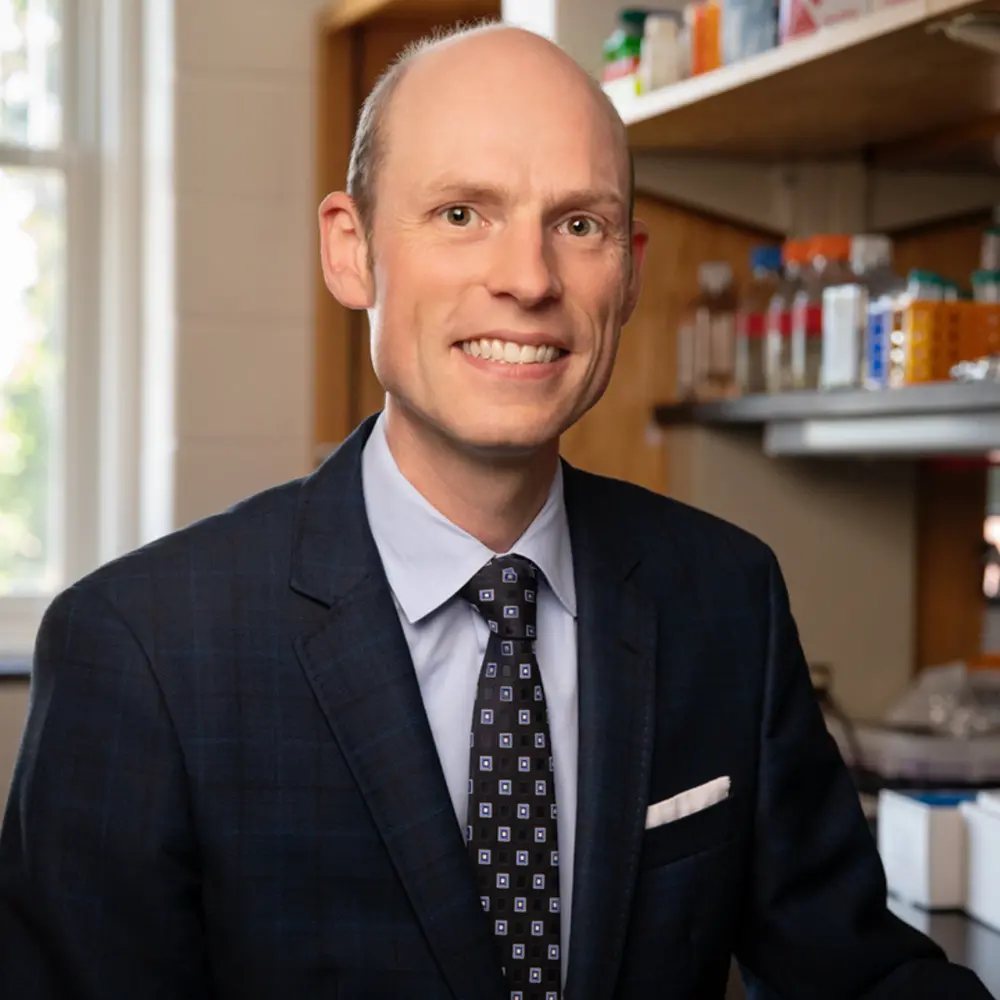
Dr. Nelson’s lab focuses on determining how different hormones and metabolite factors impact breast and ovarian cancer progression.
How did you first get interested in science?
My interest in science was piqued at an early age as I grew up next to the Rocky Mountains in Calgary, Canada, that made me inquisitive of nature and science. As a teenager in the Netherlands, the wonder of chemistry was impressed upon me by my middle school science teacher. Our chemistry teacher threw a little bit of potassium into the canal, which of course exploded and I was hooked on chemistry. She also let us observe her beehive and observing their social behaviors solidified my interest in the interface of chemistry and biology.
How was your doctoral and postdoctoral experience?
I decided to get my Ph.D. in Endocrinology studying goldfish at the University of Calgary, which was ideal as it connected both my passion for chemistry and zoology. For a brief period, I contemplated being a park ranger, but ended up pursuing a Ph.D. My post-doctoral training at Duke University is where my interests and studies on breast cancer began. I initially worked on a cholesterol compound that mimicked estrogen action, leading me to study its role in bone and breast cancer. At Duke, I also actively interacted with breast cancer advocates (typically cancer survivors), which channeled my goal towards more patient-centric science.
When did you decide to become a professor?
I admit that I was unsure whether to continue in academics or join industry. As a Ph.D. student, I thought I would become an instructor teaching undergraduate biology. It was during my post-doc studies at Duke when I realized I could simultaneously contribute to the field of breast cancer and instruct undergraduates- train the next generation of cancer biologists. I could have the best of both world. That was that!
What is your latest scientific focus?
Cholesterol is required for building cell membranes and steroid hormones like estrogen and testosterone, and elevated cholesterol levels have been implicated in breast and ovarian cancer. The initial work in my lab was looking at a metabolite of cholesterol (27-hydroxycholesterol, 27HC), as a mediator of many of these effects. 27HC can bind two hormone receptors, Estrogen Receptor (ER) and Liver X Receptor (LXR), both associated with breast cancer. Ongoing work involves understanding whether 27HC may be changing signaling through these receptors. We were surprised when we learned that cholesterol metabolism is not only important for cancer cells themselves, but for immune cells as well. Cancer cells are very adept at hijacking the immune system to their own end. By upregulating cholesterol metabolism and spewing out cholesterol metabolites like 27HC, cancer cells can suppress immune cells and prevent them from attacking cancer cells. So, we are developing strategies based on cholesterol homeostasis to re-educate the immune system to start fighting cancer again. The lab is currently collaborating with chemists and clinical partners to translate these findings.
How did your earlier work lead to this new area of research?
My desire to contribute to the field of cancer therapeutics began when my relative stated she would never undergo breast cancer treatment again. The notion was if cancer recurrence occurred even after “Radical Mastectomy”, it was because some cancer cells were still at large. I realized breast cancer was a huge problem. But also, if the patients didn’t want radical therapy, there was something grossly wrong with it. So at Duke, I picked up a breast cancer project with the notion, that we need to do better for breast cancer patients. At the time I began studying a cholesterol metabolite that was working like estrogen. This led to establishing that this metabolite itself could impact cancer recurrence and metastasis.
What advice to you have for young scientists and trainees?
My biggest advice for young scientists is to be persistent and critical. I want to stress upon the need to accept critical feedback and use it to strengthen one’s science. I personally believe that the importance of critical thinking and the use of data to guide beliefs in the scientific community rather than base them on pre-existing notions is fundamental. If you believe something, support it with data. Don’t be led by someone’s opinion instead of scientific fact. Being persistent can lead to a change in paradigm.
What do you most enjoy outside of the lab?
In addition to work (which is also fun for him), Dr. Nelson enjoys camping and hiking. In short, enjoying life. Good food and trips to cities top his list of fun things to do.
